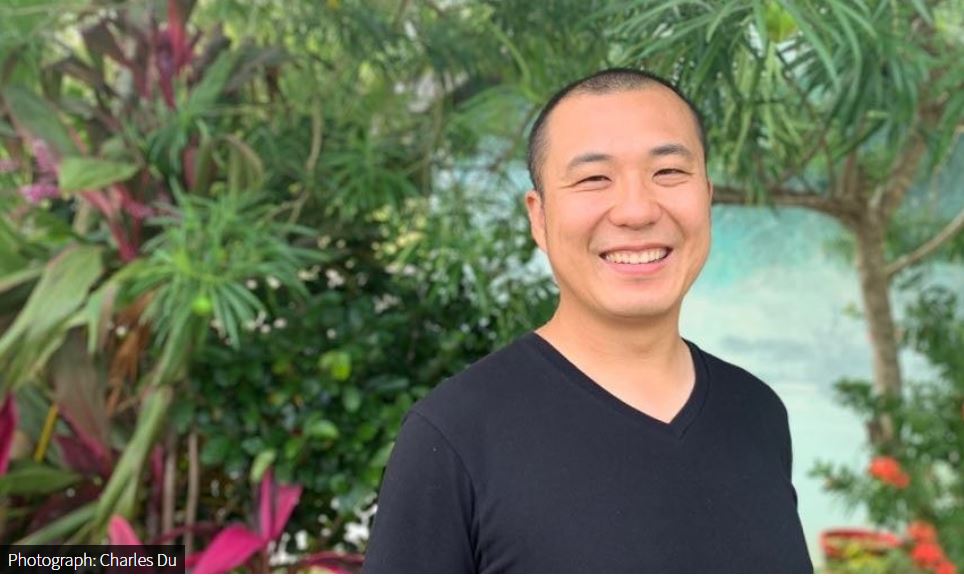Former NASA engineer comes to Taiwan to grow his eye yoga career

Editor’s note: Produced by Meet, this is one of a series of articles about foreign entrepreneurs who hold the Taiwan Employment Gold Card and the stories behind their relocation to Taiwan.
LA native Charles Du has been traveling around the world, and last year, he decided to stay in Taiwan to grow his new career as a yoga teacher, or more specifically, eye yoga teacher.
A yoga aficionado, he learned this new type of yoga by chance from a Taiwanese. It trains muscles around the eyes and has been proved to significantly improve eyesight.
Since then, he has been on a mission to promote it to the people of Taiwan, who suffer from one of the highest rates of retinal detachment in the world.
As he helps people improve their vision at Yoga Charles, Du also seeks to achieve personal growth in multiple dimensions -- physically, intellectually, spiritually, and etc.
“To me, growth is change, which means ‘to be better today than I was yesterday,’” he explains. “I feel like right now Taiwan is the best place for my growth.”
Life as digital nomad
Before leaving his hometown, Du has led a successful career as a product manager: he has developed NASA’s first app, worked on consumer products for Apple, and co-founded carsharing unicorn Getaround, where he helped with the company’s first prototype.
To him, the experience of working for big companies has been valuable. “It made me efficient and good at certain skills,” he says. “There’s also a lot of really smart people that you can learn from.”
However, he understands that he eventually needs to grow his own business if he ever wants to fully focus on personal growth, instead of working for a company, which aims to bring values to the shareholders.
Amid the coronavirus pandemic, companies are laying off their workforce to stay afloat, and this is the time when people realize their jobs aren’t as secure as they may expect, he says.
From there, Du left his career behind and started to travel around the world. He has become a digital nomad, who works from everywhere from Prague to Taipei.
“To grow naturally, I have to have the freedom to change my environment,” he says. “If I can find an environment that grows me in the area that I want, then all I have to do is to be inside it.”
With a clear vision, a person knows where to go and grow themselves, he says. However, in absence of such vision, they have to expose themselves to various experiences first.
Experience stimulates growth
Du says he has experienced a high rate of growth during a burning man event, a weeklong festival where tens of thousands of people gather in the Nevada desert to create a temporary community.

In this period of fast growth, “new ideas come to us and we get transformed in a way,” he tells Business Next.
It was his first time to experience what he calls “growth spurts" and also the moment he realized that he needs to lead a location and time location independent career to experience different environments.
“If you live in one place doing one thing, you’re only doing linear growth,” he says. “But if you’re placed in a different environment, you have the potential to do exponential growth.”
For the past few years, he would move to a new location every month and later every season, and now, he's in Taiwan, where he discovered what he's willing to devote his life to.
"By coming to Taiwan, I came across eye yoga, and that’s the effect of traveling," he says.
Drawing on his experience, Du encourages them to travel outside Taiwan and live in a different country to truly experience what wouldn’t be possible in Taiwan. “If they want to be global, they should go and experience it,” he says.
In addition, he also suggests that founders take their entire workforce to live in a foreign country in order to broaden their horizon.
Develop a feeling of truth
On top of experience, personal growth involves self-reflection. That is, after being placed in and learning from a new environment, a person has to reflect on the experience to “toss out what’s not pertinent to their life,” he says.
Du describes this process as a “cycle of expansion and condensation,” and it’s only after going through a series of these cycles can a person pick up what they feel true and lead their life with a clear vision.
Some people make life decisions based on logic, so they may weigh the pros and cons on paper before doing so. “But in the end, your heart is telling you something,” he says. “A lot people ignore their feeling and listen to their parents and the society, and the truth becomes a little hazy.”
Eventually, this feeling of truth translates into “a faith in the universe,” he says. “You feel you’re going to the right direction and the universe rewards you, and you ask yourself: ‘what are the chances that this has happened to me right now.’”
In the meantime, such feeling is also a source of innovation.
As an award-winning product manager, he says to be the best product person isn’t to be data driven -- but data informed. In other words, they don’t make decisions based on what data tell them; instead, they make decisions and see how data backs them up.
He takes Steve Jobs as an example. The innovative mind behind Apple draws a lot of truths from his feelings, and the data prove to be supporting them, he says.
“There are so many things we experience that we know are true, but it’s hard to find data to justify they’re true,” he says. Du, therefore, suggests that we “lead more with the heart, less with the mind.”
〔Original :Meet Startup @ TW〕
https://meet.bnext.com.tw/intl/articles/view/46488